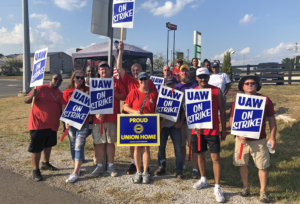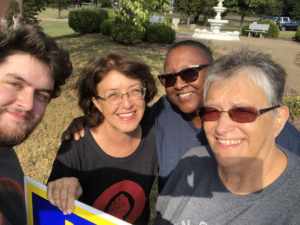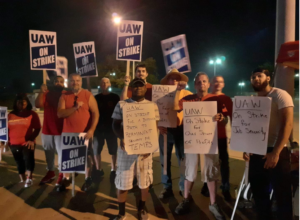
More than 49,000 workers who produce GM cars and trucks are maintaining the line nine days into their strike against the fourth-largest car company in the world. Unity is solid and pickets are at every factory gate across the United States, around the clock.
Despite the unprecedented move by General Motors Co. to cut off the strikers’ healthcare coverage Sept. 17 on the second day of the strike, the resolve is clear. The men and women of the United Auto Workers union are prepared to hold out as long as it takes to gain wage equity for the lower-paid temps, and better conditions for all.

The corporate media is chock full of General Motor Company’s PR messaging: Oh, they have offered $7 billion in investments, they have competitive wages, and on and on. But the strike was forced on the union after more than 12 years of concessions, including the introduction of “temporary workers,” who are in reality in a permanent status, but paid far lower wages than the traditional workers. And now, GM is demanding more concessions, despite record profits, including a greater percentage of healthcare costs out of workers’ pay.
The recent years have seen a major turnaround from GM’s 2009 bankruptcy, due to major concessions from the labor force and financial backing from the government. GM made $11.8 billion in profits in 2018 and in the first quarter of 2019, its revenue was $35 billion. Yet, the company is refusing to restore what the union workers lost. Five plants were shut down in 2019, leaving thousands unemployed or forced to move long distances to keep working.

There is no greater eye opener than to hear the workers themselves talk about their struggle. Why would they risk their jobs, lose income, lose healthcare, endure so much uncertainty, to go on strike?
These strikers, women and men assemblers of the Corvette sports car at the Bowling Green, Kentucky, plant tell us why:
Jack Bowers
Jack Bowers is UAW Local 2164 president. He sat down to talk at the Union Hall, along with his co-worker Earl Barnett. Both have worked at GM for more than 30 years. Barnett’s current job is team leader of workers in the chassis section.
Bowers: “The biggest issue in the strike is the temporary workers. We are out here fighting for the temps who have been given the shaft for so long. They come in here and bust their humps 40-plus hours a week in some of the hardest jobs in the country.
“They have been employed for years with no path to be hired permanently, working for much less money. They don’t have a pension, and they only get three days a year, unpaid, no other vacation or sick days! They are screwed on every avenue.
“And the “In-progression” people are being paid $10 an hour less than traditional people such as myself, and doing the same work.
“There should be a finite period for getting hired as temporary. And the In-progression people should get 50 to 75 cents per hour more every six months until they get to full pay. Everyone who is doing the same work should be getting the same money.
“Our fight is for them as well as the other stuff we are trying to negotiate. They are the ones who are going to be here after we leave. We have to make it as right as we can for them. Our retirees did that for us. We owe it to them. We take care of our retirees now and they will take care of us. We take care of each other, its solidarity.
“We had said no more tiers, and then they [GM] opened it up for more. I said, are you kidding me? I’m not at the bargaining table and I don’t know the reasons, but it is wrong. GM is making great money, they are doing very good. So it’s time to get back some of the things we lost. They took two weeks of my vacation every year for a shutdown. That is not a vacation. I understand we had to make sacrifices back then, but it is time to get it back.
“You’ve seen factory work. It breaks your body down. I have had three knee surgeries, two shoulders and a back. I am not an anomaly. Repetitive stuff breaks you down over time. That’s hard work.
“We have had so much support, people have been dropping stuff, left and right.
“We had a guy come down from Ford collected $300 on his shift, and brought us water, food. And he is out there walking the line with us. Monday, at Ford, Todd Dunn, union president talked with me, he and his other men are coming down here, and cooking lunch for every one of us. You hear solidarity but when you see and hear it, it is overwhelming, we have had the support of people. It is wonderful. Now let’s get back to work!”
Adrian Sparks
Adrian Sparks is from Pittsburgh, Pennsylvania. She was hired at a GM plant in Pittsburgh in 2000 there. When GM cut the jobs there, to keep her job, she had to accept a “forced transfer” to the Lordstown plant in Ohio, where the Chevrolet Cruze was produced. That plant is the largest factory facility in the world. This year GM shut the plant down, leaving 4,500 workers in the lurch.
Sparks: “I was employed in Pittsburgh in 2000, then at the Lordstown plant in Ohio in 2007. I drove 200 miles between Lordstown and Pittsburgh for 12 years to go to work. “And then they closed Lordstown this year. Now I’m here in Kentucky. I want to keep my job, I’m close to retirement, so here I am, reporting for strike duty.
“I have a disabled son and I had to bring him. This is life changing. I own a home in Pittsburgh, and I have to rent a home here in Kentucky. I lost my healthcare like everyone else. But I will stay on strike as long as it takes because I have faith in our union brothers and sisters that they will get us what we deserve. We give up so much and get nothing in return.”
“We make big sacrifices, you know? People are getting divorced behind this, families are breaking up. It’s ridiculous. There’s no need, we make billions of dollars for GM. So, what’s the problem? I am here to fight, I’m here to keep my job, and in solidarity we stand.”
Earl Barnett
Earl Barnett is co-chair of the Veterans Committee for Local 1564 in Bowling Green. He is team leader of the workers’ group that works on the Corvette chassis. Healthcare is a major issue in the strike. Currently, between 3 percent and 4 percent of the healthcare is paid by the workers. GM is proposing for them to start paying 15 percent, a huge increase. On the second day of the strike, GM cut off all healthcare coverage for strikers and their families.
Barnett: “We have people who are hurting from that. We had a lady who came in here, she has an ongoing appointment. Her child has an abscess and they were ready to pull five of his teeth. We had to tell her she had no healthcare whatsoever now. It’s hard to tell somebody that.
“GM is doing it because they know it is going to hurt, that is one way they can hurt people by canceling the health insurance. This is very hurtful to people. There is no way to put a value on this. I think it was out of spite, because they already paid the premium for the whole month.
“And about the temps. It’s very difficult to work beside someone, every day, 40 hours a week, and they are doing the same exact job you are doing, but they are getting paid just a little more than half what you’re getting paid. The team that I have is a very good team, as good as any in the plant. A lot of people don’t understand that once you get a car coming towards you, you only get so much time to get that one done. You can’t sit back because there’s another car coming toward you. Once thing for sure, this kind of work is not for everyone.
“I have five members on my team, my guys are really, really good team members. The are to a point, where even the instructions that are not written, they say, ‘this is what we need to do, this is what we do.’ My team members 99.9 percent of the time, they make it happen. They go way above and beyond to get things done, so someone down the line doesn’t have to worry something coming to them that is not right. We have great people willing to do whatever is needed. They are not looking for praise, they want to do things right.”
Jackie Donaldson
Jackie Donaldson is from Pittsburgh and was a member of UAW 544 there. She was transferred to the Lordstown Cruze plant when her job ended in Pittsburgh. Due to debilitating injuries on the job, she was forced to retire. She is lending her support on the picket line.
Donaldson: “When they show GM on TV, they show the easy, easy jobs. The hard jobs are when you are standing there for eight hours, putting screws and bolts, lifting tires, lifting hoods, that’s what’s hard. And when you can’t even go to the bathroom, or get a drink of water because the line is humping, it’s ridiculous.
“I’ve been injured. I’ve had both wrists done, I’ve had my knee done, and my shoulder, all from General Motors. The last injury was back surgery. The way they run the line, I couldn’t return because I can’t go more than 25 minutes standing. And they wouldn’t work with you. So I had to retire. I have to have a hip replacement. There are nights I can’t sleep because I hurt so bad. It is all because of what we people go through on that line. It is not easy work.
“When we were in Pittsburgh, it was a fab plant. It was leveled down, it had been a stamp plant. One time the temperature there registered 115 degrees. The further back in you went, the hotter it gets. You had to do welding and the sparks would fly up and hit you in the eye. When it went up underneath your safety glasses, you would see sparks and get the metal in your eye.
“When I was in Lordstown, I was in the trim area. My job was, when the car came down from the paint job, I had to put the manifest on the front, I had to line up the VIN number, I had to go to the side of the car, put the number on the door handle, I had to put the antenna on in the back, and I had to put the back window light in, plus I had to put another manifest on. And then I had to hurry up and get everything ready, because my numbers could not be out of sync or else the line would go down. And then you have to go to the next car.
“The thing that really got me was when they forced rotation. My next job was a moving platform, you had to get this hydraulic thing, hook it up to the door, bend inside the door, take out all the bolts, take out the chain link, then lift this door. You are on a moving platform, then you go to a solid platform, You gotta put it on what they call the mule. And you can’t stop, because now the next car is there. You have to make sure you get it right or it won’t go. Then you have to hurry back and work on the next door. That’s what threw out my back. I took retirement last year. There was no way I could continue.”






